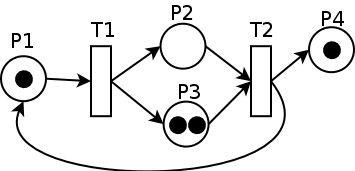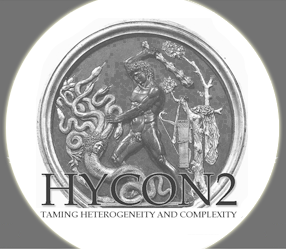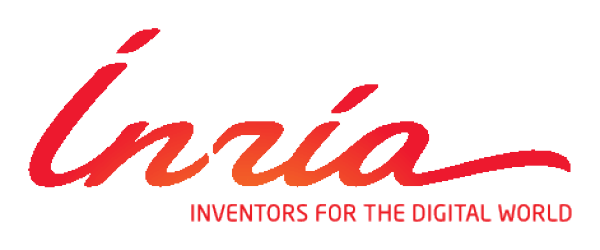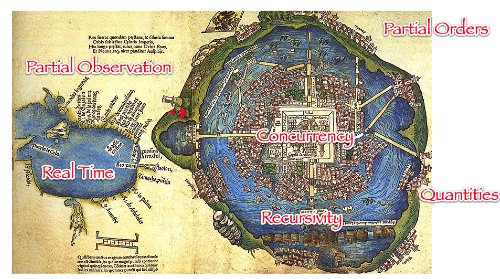MEXICO: Modelling and Exploitation of Interaction and Concurrency
Research Topics
In the increasingly networked world, reliablity of applications becomes ever more critical as the number of users of, e.g., communication systems, web services, transportation etc grows steadily. MExICo works towards a better understanding and an increased reliability of distributed and asynchronous systems, and thus join the existing effort of many other teams that use formal methods; what is particular in the present proposal is that our team focusses its research on the two features of concurrency and interaction.Members
Permanent Members | |||
|
Thomas Chatain
Assistant professor, ENS Paris-Saclay |
Serge Haddad
Professor, ENS Paris-Saclay |
||
|
Matthias Függer
Researcher, CNRS |
Stefan Haar
Senior researcher, Inria Saclay-Île de France |
Stefan Schwoon
Assistant professor, ENS Paris-Saclay |
|
Associated and Temporary Members | |||
|
Philippe Dague
Visiting professor, UPSud |
Lina Ye
Visiting professor, Centrale Supélec |
Benoît Barbot
Associated professor, Université Paris-Est Créteil |
|
Ph.D. Students | |||
|
Mathilde Boltenhagen
PhD student |
Igor Khmelnitsky
PhD student |
Hugues Mandon
PhD student, Inria |
|
|
Juraj Kolcak
PhD student, ANR-FNR AlgoReCell |
|||
Detailed Presentation
 The increasing size and the networked nature of communication systems, controls,
distributed services etc. confront us with an ever higher degree of
parallelism between local processes. For any form of analysis and control, a
global view of the system state leads to overwhelming numbers of states and
transitions, and blurs the mechanics that are at work rather than exhibiting
them. Conversely, respecting concurrency relations avoids exhaustive
enumeration of interleavings, and allows to focus on 'essential' properties of
nonsequential processes characterized by causal precedence relations. We see
concurrency in distributed systems as an opportunity rather than a nuisance
that leads to state space explosion in the formal models and slows down
algorithms.
The increasing size and the networked nature of communication systems, controls,
distributed services etc. confront us with an ever higher degree of
parallelism between local processes. For any form of analysis and control, a
global view of the system state leads to overwhelming numbers of states and
transitions, and blurs the mechanics that are at work rather than exhibiting
them. Conversely, respecting concurrency relations avoids exhaustive
enumeration of interleavings, and allows to focus on 'essential' properties of
nonsequential processes characterized by causal precedence relations. We see
concurrency in distributed systems as an opportunity rather than a nuisance
that leads to state space explosion in the formal models and slows down
algorithms.
The MExICo team works on complex and concurrent systems from both a theoretical and practical point of view. Our work is driven by applications in two fields, namely 1.) Cyber-physical systems and 2.) Biological systems, and by the methodological challenges posed on the abstract level in the context of
- A: hybrid/timed/asynchronous systems,
- B: distribution and concurrency, and
- C: partially observable systems.
Application 1: Cyber-physical systems (CPS)
CPS are organized as networks of digital components which, on the one hand, analyze information flows coming via sensors from the environment, and on the other hand, react by controlling actuators. The efficient management of these flows raises in particular the problems of choosing an architecture and setting clock frequencies. We have attacked this problem by weakening the classical untimed Boolean abstraction of circuits, and treat them as timed hybrid systems with analog effects. Our goals include- to more accurately predict timing and power consumption, and thus reduce conservative frequency and power margins; and
- to enable formal verification of circuits, meeting solvability boundaries of classical problems such as short pulse filtration.
Application 2: Biological systems
I: (Re-)programming in discrete concurrent models
Cellular Regulatory networks - on the level of individual cells - exhibit highly complex concurrent behaviours that are influenced by a high number of perturbations such as mutations. We are in particular investigating discrete models, both in the form of boolean networks and of Petri nets, to harness this complexity, and to obtain viable methods for two interconnected and central challenges:- find attractors, i.e. long-run stable states or sets of states, that indicate possible phenotypes of the organism under study, and
- determine reprogramming strategies that apply perturbations in such a way as to steer the cell's long-run behaviour into some desired phenotype, or away from an undesired one.
II : Distributed Algorithms in wild or synthetic biological systems
On the multi-cell level, we work with a distributed algorithms view on microbiological systems, both with the goal to model and analyze existing microbiological systems as distributed systems, and to design and implement distributed algorithms in synthesized microbiological systems. Major long-term goals are drug production and medical treatment via synthesized bacterial colonies.Research topic A: Systems continuous in state and time
We study modeling, controller synthesis, and verification for systems that are continuous in state, time, or both. In particular, this includes- use of hybrid system models as abstraction for differential equations, e.g. describing signal traces of digital gates, to enable verification of high-speed digital circuits;
- Continuous state Continuous Petri nets (CPN)
Research topic B: Distributed and concurrent systems
The analysis of discrete event systems is one of the central activities of the team. We investigated several topics concerning concurrent systems and distributed algorithms.Unfoldings
The study of the partial order semantics of Petri nets and related models has brought results on diverse applications, and on the theory in its own right, such as for reset nets, summaries, reveals relations, and goal-driven unfoldings; this is one of our key approaches.Distributed Algorithms
We consider distributed algorithms for dynamic communication networks to solve agreement problems. These algorithms occur as building blocks in distributed control applications, such as distributed clock synchronization. One major topic of research is metastability-tolerant circuits; it has applications in high-speed control circuits and fault-tolerant implementation of distributed algorithms.Research topic C: Partially observable systems
In many systems, one or several observers can see only parts of the execution, and strive to gain knowledge about the system state.Diagnosis and Opacity
These observers may be- friendly (performing diagnosis or testing) or hostile (trying to infer secrets, in which case the designer wants to make the system opaque), and
- be passive or active, i.e. help the system to either avoid or diagnose faults;
Process Mining
When no complete model of the underlying dynamic system is available, the analysis of logs may allow to reconstruct such a model, or at least to infer some properties of interest; this activity, which has emerged over the past 10 years on the international level, is referred to as process mining. We have studied unfolding-based unfolding-based process discovery , and the study of process alignments, and continue to work on these fields under the particular angle of concurrent systems.Tools
COSMOS
COSMOS is a statistical model checker for Hybrid Automata Stochastic Logic. It evaluates such formulas on a Discrete Event Stochastic Process (DESP), a class of stochastic models which includes, but is not limited to, Markov chains. As a result, HASL verification turns out to be a unifying framework where sophisticated temporal reasoning is naturally blended with elaborate reward-based analysis. Cosmos is written in C++ and is freely available to the research community.MOLE
MOLE - A Petri Net Unfolder implements the Esparza/Römer/Vogler unfolding algorithm for low-level Petri nets.
National and International Collaborations
Ongoing projects
Past projects
- INRIA associated team LIFEFORM
- NoE Hycon2

- LIA INFORMEL
- ANR ImpRo
- EU Project DISC
- FP7 Univerself

- ANR DOTS

- ANR CHECKBOUND

